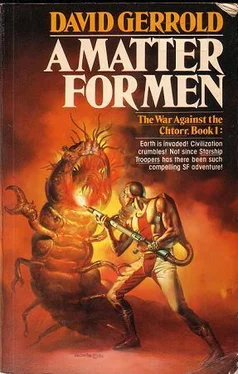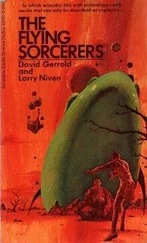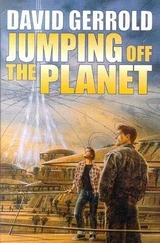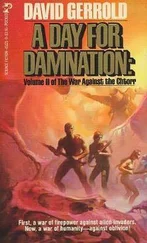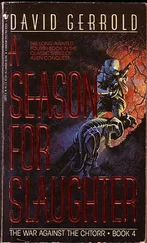David Gerrold - A Matter for Men
Здесь есть возможность читать онлайн «David Gerrold - A Matter for Men» весь текст электронной книги совершенно бесплатно (целиком полную версию без сокращений). В некоторых случаях можно слушать аудио, скачать через торрент в формате fb2 и присутствует краткое содержание. Год выпуска: 1983, Жанр: Боевая фантастика, на английском языке. Описание произведения, (предисловие) а так же отзывы посетителей доступны на портале библиотеки ЛибКат.
- Название:A Matter for Men
- Автор:
- Жанр:
- Год:1983
- ISBN:нет данных
- Рейтинг книги:4 / 5. Голосов: 1
-
Избранное:Добавить в избранное
- Отзывы:
-
Ваша оценка:
- 80
- 1
- 2
- 3
- 4
- 5
A Matter for Men: краткое содержание, описание и аннотация
Предлагаем к чтению аннотацию, описание, краткое содержание или предисловие (зависит от того, что написал сам автор книги «A Matter for Men»). Если вы не нашли необходимую информацию о книге — напишите в комментариях, мы постараемся отыскать её.
A Matter for Men — читать онлайн бесплатно полную книгу (весь текст) целиком
Ниже представлен текст книги, разбитый по страницам. Система сохранения места последней прочитанной страницы, позволяет с удобством читать онлайн бесплатно книгу «A Matter for Men», без необходимости каждый раз заново искать на чём Вы остановились. Поставьте закладку, и сможете в любой момент перейти на страницу, на которой закончили чтение.
Интервал:
Закладка:
"Uh, yeah. There's a question in there, but I don't know what it is. It's just-I don't get it."
"I see that. And thanks for being honest about it-that's good. So let me work with that for a second. Let's start with the facts about the Teamwork Army. These are men who are building things. People who build things tend to be very defensive about the things they build. It's called territoriality. It turns out they make very good soldiers. Yes, the possibility is there. The Teamwork Army could be converted to a regular military force in ... oh, let me see, now-what did that report say?" He made a show of returning to his clipboard and calling up a specific page of notes. "Ah-twelve to sixteen weeks."
He paused. He let it sink in. He looked around the classroom, meeting the gaze of everyone who dared to look at him. I think we were horror-struck; I know I was. It wasn't the answer I wanted to hear. After a long, uncomfortable silence, Whitlaw said quietly, "So what?" He stepped out into the middle of the room again. "The question is not why is that possibility there-because there is always that possibility of military adventurism-the question is what, if anything, do we do about it?"
Nobody answered.
Whitlaw grinned at us. "That's what this course is about. That responsibility. Eventually it's going to be yours. So your assignment is to look at how you'd like to handle it. What would you do with the army? It's your tool. How do you want to use it? We'll talk about that tomorrow. Thank you, that'll be it for today." He returned to the podium, picked up his clipboard and left the room.
Huh-? We sat and looked at each other. Was that it? Patricia looked unhappy. "I don't like it," she said. "And I still don't know what to do about my draft board."
Somebody poked her. "Don't worry about it," he said. "You'll think of something. You've got time."
But he was wrong.
She didn't have time-and neither did any of the rest of us. She was dead within six months. And so were most of the rest of my classmates.
EIGHT
WHEN THE plagues first appeared, the medical community assumed they were of natural origin, simple mutations of already familiar diseases. Hence the names: Black Peritonitis, African Measles, Botuloid Virus, Comatosis and Enzyme Reaction 42-that last one was particularly vicious. They were so virulent and they spread so fast that it wasn't until afterward that all of them were identified.
I remember Dad frowning as he read the newspaper each night. "Idiots," he muttered. "I'm only surprised it didn't happen sooner. Of course you're going to get plague if you put that many people into a place like Calcutta."
Within a couple of weeks, the frown gave way to puzzlement. "Rome?" he said. "I thought the Italians were more careful than that."
When it hit New York, Dad said, " `Nita, I think we should move up to the cabin for a few weeks. Jim, you'll come with us, of course."
"But, I've got school-"
"You can afford to miss it. I think I'll call your sister too." At first, the doctors thought they were dealing with only one disease-but one with a dozen contradictory symptoms. They thought that it took different forms, like bubonic and pneumonic plague. Then they thought that it was so unstable it kept mutating. Everyone had a theory: the super-jumbos were the vectors; we should ground all air travel at once and isolate the disease. Or the bacterio-ecology had finally developed a widespread tolerance for our antibiotics; we shouldn't have used them so freely in the past. Or it was all those experiments with fourth-dimensional physics; they were changing the atmosphere and causing weird new mutations. Things like giant centipedes and purple caterpillars.
The first wave swept across the country in a week. A lot of it was carried by the refugees themselves as they fled the East Coast, but just as much was spread by seemingly impossible leapfrog jumps. Airplanes? Or something else? There was no direct air service at all to Klamath, California, yet that city died before Sacramento.
I remember one broadcast; this scientist-I don't remember his name-was claiming that it was biological warfare. He said there were two kinds of agents: the Y-agents for which there were vaccines and antitoxins, and the X-agents for which there were no defenses at all. Apparently, he said, some of these X-agents must have been released, either accidentally or perhaps by terrorists. There was no other way to explain this sudden outbreak of worldwide uncontrollable death.
That idea caught on real fast. It made sense. Within days the country was in an uproar. Screaming for revenge. If you couldn't kill the germ, at least you could strike back at the enemy responsible for releasing it.
Except-who was that? There was no way of knowing. Besides -and this was the horrible thought-what if the bugs were ours? There were just as many people willing to believe that too.
After that, things fell apart real fast. We heard some of it on the short wave radio. It wasn't pretty.
We were fairly well isolated where we were, even more so after somebody went down to the junction one night and set the bridge on fire. It was an old wooden one and it burned for hours, until it finally collapsed into the stream below. Most of us who lived on the hill knew about the shallow place two miles upstream. If necessary you could drive a vehicle across there, but Dad had figured that the burned-out bridge would stop most refugees from trying to come up the mountain. He was almost right. One of our neighbors down the hill radioed us once to warn of a caravan of three land-rovers heading our way, but not to worry. A while later we heard some shooting, then nothing. We never heard anything more about it.
After that, however, Dad kept a loaded rifle near the door, and he taught all of us how to use it-even the kids. He was very specific in his instructions. If we did shoot someone, we were to burn the bodies, all their belongings, their cars, their animals and everything they had touched. No exceptions.
We stayed on the mountain all summer. Dad phoned in his programs until the phones stopped working; then he just kept working without sending them in. I started to ask him once why he kept on, but Mother stopped me. Later, she said to me, "Jim, it doesn't matter if there's ever going to be anyone again who'll want to play one of his games-he's doing them for himself. He has to believe-we all do-that there will be a future."
That stopped me. I hadn't thought about the future-because I hadn't comprehended the awesome scale of the pestilence. I had stopped listening to the radio early on. I didn't want to know how bad it was. I didn't want to hear about the dead dying faster than the living could bury them-whole households going to bed healthy and all of them dying before they awoke. I didn't want to hear about the bodies in the streets, the panic, the looting, the burnings-there had been a firestorm in Los Angeles. Was anybody left alive?
We stayed on the mountain all winter too. It was rough, but we managed. We had a windmill, so we had electricity-not a lot, but enough. We had a solar roof and a Trombe wall, we wore sweaters and we stayed warm. We'd used the summer to build a greenhouse, so we had vegetables, and when Dad brought down the deer, I understood why he had spent so much time practicing with the crossbow. We survived.
I asked him, "Did you know that something like this would happen?"
He looked up at me across the body of the deer. "Something like what?"
"The plagues. The breakdown."
"Nope," he said, wiping his forehead. The insides of that animal were hot. He bent back to his task. "Why do you ask?"
"Um, the crossbow, the cabin-and everything. Why this particular mountain? I always thought you were a little bit ... well, wobbly for making such a thing about being self-sufficient. Now it seems like awfully good planning."
Читать дальшеИнтервал:
Закладка:
Похожие книги на «A Matter for Men»
Представляем Вашему вниманию похожие книги на «A Matter for Men» списком для выбора. Мы отобрали схожую по названию и смыслу литературу в надежде предоставить читателям больше вариантов отыскать новые, интересные, ещё непрочитанные произведения.
Обсуждение, отзывы о книге «A Matter for Men» и просто собственные мнения читателей. Оставьте ваши комментарии, напишите, что Вы думаете о произведении, его смысле или главных героях. Укажите что конкретно понравилось, а что нет, и почему Вы так считаете.
